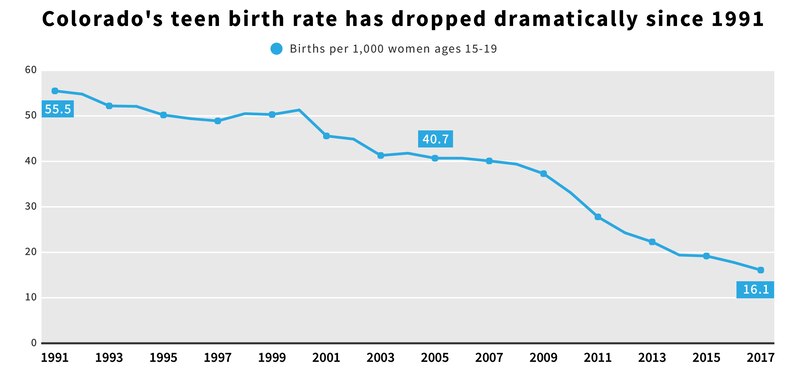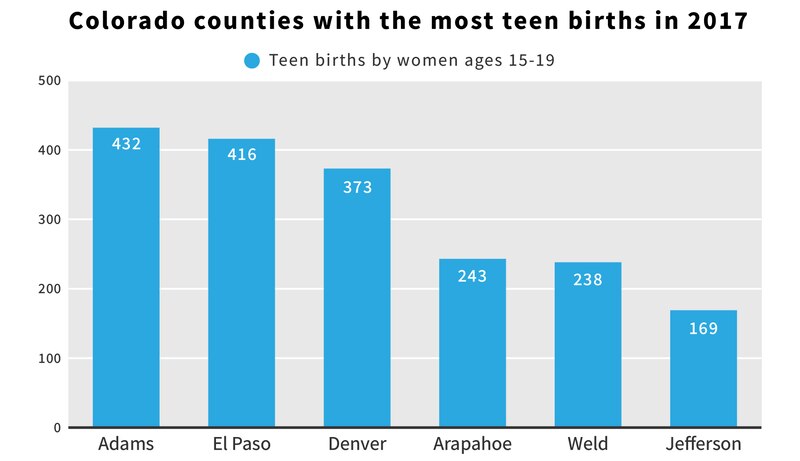There was just one student in the Boulder Valley School District’s teen parent program last year. She graduated in May, and and the district spent the summer turning the program’s nursery into a child care center for staff.
In the Englewood district just south of Denver there were no students in the teen parent program last year, and in the western Colorado city of Montrose, the long-standing charter school for pregnant and parenting teens was newly closed because of dwindling enrollment.
These are just a few examples of Colorado’s shifting educational landscape for teen parents and the school districts that serve them. As some programs downsize or close their doors, others have worked to adapt to the times — stepping up advertising, adding online offerings, or moving away from single centralized programs.
In part, these trends are driven by the state’s record-low teen birth rate, which mirrors national declines. Other factors that may be siphoning students away from teen parent programs include the option of virtual school, the fading stigma of teen parenthood, and the ease of getting a job in Colorado’s thriving economy.
For many advocates, the changing shape of teen parent programs is cause for both celebration and concern. On one hand, it’s a testament to the success of a state program — launched with private funding in 2008 — that provided long-acting birth control to low-income women.
At the same time, they worry that such public-health victories obscure the fact that nearly 3,000 Colorado teenagers are still having babies every year — circumstances that put them at high risk for dropping out of school.
“There’s still a need for programs like ours,” said Suzanne Banning, president and CEO of the Denver-based Florence Crittenton Services, which runs the state’s oldest high school for pregnant and parenting teens in partnership with Denver Public Schools.
“In the long run, without these programs being there, you’re going back to having these young moms not having a place to go and not graduating, and then their kids have a higher probability of becoming a teen mom or teen dad,” she said.
Sizing it up
It’s hard to get an exact picture of how many Colorado school districts offer teen parent programs and how many students enroll in them each year. For the most part, the state education department doesn’t track this.
It does tally enrollment for stand-alone schools for pregnant and parenting teens, but there are just two: Florence Crittenton and New Legacy Charter School in Aurora.

Meanwhile, some districts, such as St. Vrain, Westminster, and Mesa County Valley, house teen parent programs within larger alternative high schools and others, such as Aurora, serve teen parents with mobile teams that visit multiple schools. In both cases, state enrollment counts don’t distinguish teen parents from other students.
Pat Paluzzi, president and CEO of the national organization Healthy Teen Network, which promotes teen sexual and reproductive health, said there’s no clear-cut national data on teen parent programs either. Still, she’s heard plenty of anecdotal evidence pointing to a shrinking footprint.
Some teen parent programs, she said, closed down even before dramatic declines in the teen pregnancy rate, in part because federal funding streams dried up.
“Support for the teen parent in general has really waned over time,” Paluzzi said.
As separate programs for teen parents have dwindled, support for such students at traditional high schools sometimes ramps up, she said, but it varies widely by school and district.
For 16-year-old Alexia Alvarado, who became pregnant in September of her freshman year at Longmont’s Skyline High School in northern Colorado, it was a tough slog.
She said while her teachers were extremely supportive, her classmates were “weirded out” by her pregnancy.
“It was definitely awkward. I felt like a wild animal,” she said. “I get it they were curious, but the staring every day was very unnecessary.”
Alvarado, whose son Gabriel is now 15 months old, stayed at Skyline through her freshman year and transferred to the district’s teen parent program at the alternative Olde Columbine High School for her sophomore year.
It wasn’t her first choice, she said. She initially wanted to enroll in online classes, but soon realized her tendency to procrastinate and the distraction of her baby while she studied would derail her.
Although Alvarado had heard Olde Columbine was for “troubled kids,” her advocate at a local agency convinced her to give it a try. She has no regrets.
Alvarado likes having Gabriel in the same building — until January when he’ll age out of the on-site nursery — and loves the supportive vibe from staff and students. Occasionally, she’s had twinges of interest in returning to a mainstream high school so she can participate in time-honored traditions like prom, but she pushes those aside.
“To me the most important thing is my future,” said Alvarado, who wants to go to a four-year college and become a neonatal nurse.
“If I went to regular high school I would just be another student. At Olde Columbine, teachers you don’t even have know your name.”
End of an institution
For nearly two decades, Montrose had a stand-alone school for pregnant and parenting teens, Passage Charter School. It closed at the end of the 2016-17 school year.
Montrose Superintendent Stephen Schiell said, “The bottom line was they didn’t have enough students to stay open … It wasn’t feasible.”
He said there were fewer than 10 students at the school when it closed.
Sarah Fishering, who is on the Montrose school board but spoke to Chalkbeat as a private citizen, was initially upset because the school’s closing meant the loss of sorely needed child care spots in the rural community. At the end, her two young children were among those enrolled at the school’s nursery, which served both teen parents and community members.
Fishering worries the program’s demise leaves a massive void for teen parents in the region.
“I kept on hearing from people, ‘Isn’t it wonderful that we don’t need Passage Charter School anymore?’” she said. “However, in Montrose … and also in our neighboring county of Delta, there are particularly high rates of teen pregnancy.”

Both counties have rates well above the 2017 Colorado average of 16 births per 1,000 women ages 15 to 19. The rate was 32 births per 1,000 women in Delta County and 26 births per 1,000 in Montrose County. Last year, 58 babies were born to teens 15 to 19 in the two counties.
Even in Colorado’s populous urban areas, some teen parent programs have contracted in recent years.
Banning said until about 2012 Florence Crittenton High School served 300 or more pregnant and parenting teens a year. These days, it’s around 220.
As that dip occurred, she said, the school began advertising on bus benches and through spots on the Spanish-language television station Telemundo.
At New Legacy, which opened in 2015, school officials have seen a growing number of non-parents enroll — often siblings or cousins of teen parents.
Last year, about 30 of the school’s 100 students were neither pregnant nor parenting, up from about a dozen two years earlier, said Sarah Bridich, chairperson of the New Legacy board.
She believes interest from students who aren’t teen parents stems from the fact that New Legacy is a small non-traditional school that offers lots of personal attention — and isn’t a sign that there are too few teen parents to fill its seats.
Like Banning, she said it’s important for the school to actively recruit prospective students.
“It would be a great problem if we closed [because] there weren’t pregnant and parenting teenagers,” she said. “I don’t foresee that happening in the near future.”
Evolution and expansion
In some districts, declining enrollment in stand-alone teen parent programs has spurred officials to try something new. That’s how Boulder Valley leaders see the shift in their program, which was down to one student last year.
Joan Bludorn, principal of Arapahoe Ridge High School where the teen parent program used to be housed, said besides decreasing teen pregnancy rates, changing cultural norms have contributed to the evolution of the district’s teen parent programs.
“Many of the students want to stay in their home high school,” she said. “Pregnancy is not looked upon as it was 20 to 30 years ago when you [left] your building.”
Starting this year, the teen parenting class that used to be taught at Arapahoe Ridge will be available online, with the course’s longtime teacher supervising participants. While the high school’s nursery for teen parents has been repurposed as a staff child care center, Bludorn said there will still be spots for children of students if needed.
Mary Faltynski, coordinator of Boulder County’s GENESIS home-visiting program for teen parents, said when stand-alone programs shrink, it’s important for districts to think differently.
“We have to say, ‘OK, maybe we don’t have a school’s worth of students who need a special program, but we have to look at how to help students individually in their own schools.’”
In the Aurora school district, the teen parent program became stagnant several years ago, after the high school where it was housed relocated to a new building, shifted to an expeditionary learning model, and shed its alternative school reputation. Only a handful of teen parents remained in the program a couple years into the switch, said Anne Burris, a nurse who leads the district’s Young Parent Support Program.
That’s when the district created a mobile team that works with pregnant and parenting teens — both mothers and fathers — connecting them with child care, advocating for them in their schools, and helping them prepare for college or jobs. The team, made up of Burris and three advocates, served 261 students across the district last year.
Across the state in Grand Junction, the teen parent program continues to be housed in the alternative R-5 High School, but two years ago got a much-needed ingredient: more nursery space.
Before the expansion, “We’d start off with 30 parents and we were losing eight to 10 young parents because they didn’t have a place to put their toddlers,” said R-5 Principal Don Trujillo.
In 2016, the school relocated to a new building and added eight spots for toddlers on top of the eight it already had for infants. Now, more teen parents are staying at R-5 for the whole school year, he said.
The Fort Collins-based Poudre School District has similar plans for its teen parent program, which last year moved from one of the district’s comprehensive high schools to a K-12 hybrid school called Poudre Global Academy. There, students take on-site classes two days a week and work online the rest of the time. District officials plan to open an on-site nursery at the school as soon as next year.


